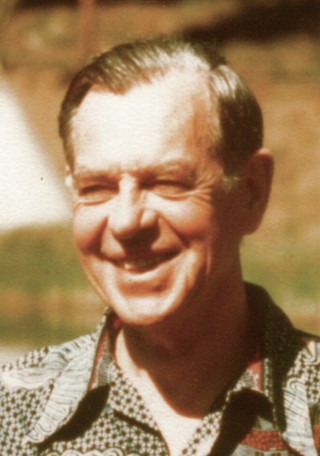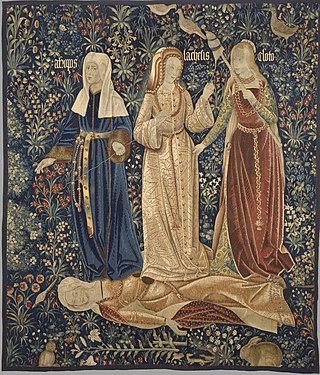
Joseph John Campbell was an American writer. He was a professor of literature at Sarah Lawrence College who worked in comparative mythology and comparative religion. His work covers many aspects of the human experience. Campbell's best-known work is his book The Hero with a Thousand Faces (1949), in which he discusses his theory of the journey of the archetypal hero shared by world mythologies, termed the monomyth.
Religion and mythology differ in scope but have overlapping aspects. Both are systems of concepts that are of high importance to a certain community, making statements concerning the supernatural or sacred. Generally, mythology is considered one component or aspect of religion. Religion is the broader term: besides mythological aspects, it includes aspects of ritual, morality, theology, and mystical experience. A given mythology is almost always associated with a certain religion such as Greek mythology with Ancient Greek religion. Disconnected from its religious system, a myth may lose its immediate relevance to the community and evolve—away from sacred importance—into a legend or folktale.

Alice Ann Bailey was a writer of more than twenty-four books on theosophical subjects, and was one of the first writers to use the term New Age. Bailey was born as Alice La Trobe-Bateman, in Manchester, England. She moved to the United States in 1907, where she spent most of her life as a writer and teacher.

Proto-Indo-European mythology is the body of myths and deities associated with the Proto-Indo-Europeans, speakers of the hypothesized Proto-Indo-European language. Although the mythological motifs are not directly attested – since Proto-Indo-European speakers lived in preliterate societies – scholars of comparative mythology have reconstructed details from inherited similarities found among Indo-European languages, based on the assumption that parts of the Proto-Indo-Europeans' original belief systems survived in the daughter traditions.

In narratology and comparative mythology, the hero's journey, also known as the monomyth, is the common template of stories that involve a hero who goes on an adventure, is victorious in a decisive crisis, and comes home changed or transformed.

James Hillman was an American psychologist. He studied at, and then guided studies for, the C.G. Jung Institute in Zürich. He founded a movement toward archetypal psychology and retired into private practice, writing and traveling to lecture, until his death at his home in Connecticut.

Lachesis, in ancient Greek religion, was the middle of the Three Fates, or Moirai; the others were her sisters, Clotho and Atropos. Normally seen clothed in white, Lachesis is the measurer of the thread spun on Clotho's spindle, and in some texts, determines Destiny, or thread of life. Her Roman equivalent was Decima. Lachesis was the apportioner, deciding how much time for life was to be allowed for each person or being. She measured the thread of life with her rod. She is also said to choose a person's destiny after a thread was measured. In mythology, it is said that she appears with her sisters within three days of a baby's birth to decide the baby's fate.
Depth psychology refers to the practice and research of the science of the unconscious, covering both psychoanalysis and psychology. It is also defined as the psychological theory that explores the relationship between the conscious and the unconscious, as well as the patterns and dynamics of motivation and the mind. The theories of Sigmund Freud, Carl Gustav Jung, and Alfred Adler are all considered its foundations.
Jean Houston is an American author involved in the human potential movement. Along with her husband, Robert Masters, she co-founded the Foundation for Mind Research.
Archetypal psychology was initiated as a distinct movement in the early 1970s by James Hillman, a psychologist who trained in analytical psychology and became the first Director of the Jung Institute in Zürich. Hillman reports that archetypal psychology emerged partly from the Jungian tradition whilst drawing also from other traditions and authorities such as Henry Corbin, Giambattista Vico, and Plotinus.
The mythopoetic men's movement was a body of self-help activities and therapeutic workshops and retreats for men undertaken by various organizations and authors in the United States from the early 1980s through the 1990s. The term mythopoetic was coined by professor Shepherd Bliss in preference to the term "New Age men's movement". Mythopoets adopted a general style of psychological self-help inspired by the work of Robert Bly, Robert A. Johnson, Joseph Campbell, and other Jungian authors. The group activities used in the movement were largely influenced by ideas derived from Swiss psychiatrist Carl Gustav Jung, known as Jungian psychology, e.g., Jungian archetypes, from which the use of myths and fairy tales taken from various cultures served as ways to interpret challenges facing men in society.
Mythic Journeys is a performance festival and conference gathering held in Atlanta, Georgia, United States. Founded in 2004, it began as a celebration of the works of Joseph Campbell and has expanded into a celebration of the role of myth and storytelling in the modern world.
![<span class="mw-page-title-main">Malidoma Patrice Somé</span> Author and workshop leader (1956-2021), born in [[West Africa]]](https://upload.wikimedia.org/wikipedia/commons/thumb/7/73/Malidomacrop.jpg/320px-Malidomacrop.jpg)
Malidoma Patrice Somé (1956–2021) was a writer and workshop leader, primarily in the field of spirituality. Born in a Dagara community in Dano, Burkina Faso, West Africa, he was raised by Jesuit priests from the age of four, pursued higher education in the West, and spent most of his adult life in the United States and Europe.

The Fates are a common motif in European polytheism, most frequently represented as a trio of goddesses. The Fates shape the destiny of each human, often expressed in textile metaphors such as spinning fibers into yarn, or weaving threads on a loom. The trio are generally conceived of as sisters and are often given the names Clotho, Lachesis, and Atropos, which are the names of the Moirai, the version of the Fates who appear in Greek mythology. These divine figures are often artistically depicted as beautiful maidens with consideration to their serious responsibility: the life of mortals. Poets, on the other hand, typically express the Fates as ugly and unwavering, representing the gravity of their role within the mythological and human worlds.

Egyptian mythology is the collection of myths from ancient Egypt, which describe the actions of the Egyptian gods as a means of understanding the world around them. The beliefs that these myths express are an important part of ancient Egyptian religion. Myths appear frequently in Egyptian writings and art, particularly in short stories and in religious material such as hymns, ritual texts, funerary texts, and temple decoration. These sources rarely contain a complete account of a myth and often describe only brief fragments.
Myth is a genre of folklore or theology consisting primarily of narratives that play a fundamental role in a society, such as foundational tales or origin myths. For folklorists, historians, philosophers or theologians this is very different from the use of "myth" simply indicating that something is not true. Instead, the truth value of a myth is not a defining criterion.
Nor Hall. Hall is a post-Jungian psychotherapist and author. Her work focuses on archetypal studies, particularly gender issues and cultural mythology.
Dennis Patrick Slattery is an author, poet and educator. He is a core faculty member at Pacifica Graduate Institute, where he was involved in the development of the Mythological Studies program. He is best known for his book, The Wounded Body, which was included in The Best Books for Academic Libraries in 2002.
Mythotherapy is a therapeutic method based on psychology, mythology, Cognitive Sciences, CBT, anthropology, philosophy and ancient knowledge and wisdom for therapeutic intentions.

The Buddhist traditions have created and maintained a vast body of mythological literature. The central myth of Buddhism is the life of the Buddha. This is told in relatively realistic terms in the earliest texts, and was soon elaborated into a complex literary mythology. The chief motif of this story, and the most distinctive feature of Buddhist myth, is the Buddha's renunciation: leaving his home and family for a spiritual quest. Alongside this central myth, the traditions contain large numbers of smaller stories, which are usually supposed to convey an ethical or Buddhist teaching. These include the popular Jātakas, folk tales or legends believed to be past lives of Gautama Buddha. Since these are regarded as episodes in the life of the Buddha, they are treated here as “myth”, rather than distinguishing between myth, legend, and folk-tale.







![<span class="mw-page-title-main">Malidoma Patrice Somé</span> Author and workshop leader (1956-2021), born in [[West Africa]]](https://upload.wikimedia.org/wikipedia/commons/thumb/7/73/Malidomacrop.jpg/320px-Malidomacrop.jpg)


